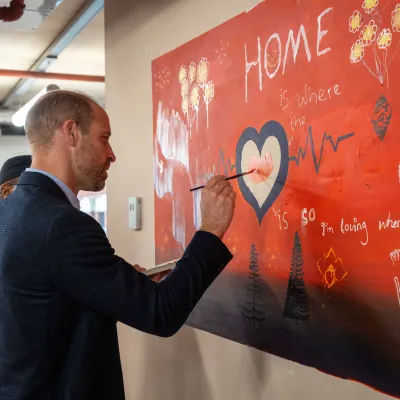Councils in England faced a shortfall of £400 million in 2023-2024 forcing many of them to turn away young people facing homelessness without the assessment they are legally entitled to, let alone the support they may have needed.
Our latest Youth Homelessness Databank revealed that over 104,000 young people in England faced homelessness in 2023-2024, and one-third of these young people did not receive an assessment - let alone the support they may have needed.
New research from Centrepoint has calculated the amount of funding needed by English local authorities to meet their obligations under the Homelessness Reduction Act of 2017 (HRA) by assessing and potentially supporting these young people.
The Problem
Earlier this year, Centrepoint’s Databank revealed that only 67 percent of young people who approached their local authorities for homelessness support received an assessment. In some areas this rate was much lower, for example, in the East of England the assessment rate was 49 percent.
While some of these discrepancies may be attributable to young people not meeting the threshold for an assessment and subsequent support, it’s clear that some councils are ‘gatekeeping’ access to support and turning away people who should be entitled to help leaving them trapped in homelessness.
Years of underfunding, combined with the escalating costs associated with a range of services, including the provision of temporary accommodation, have strained local government resources. The recent high-profile instances of local authorities issuing Section 114 notices (declaring that they cannot balance their budgets) highlight the financial pressure that councils are experiencing, which temporary accommodation expenditure is contributing to.
What’s happening in local authorities’ homelessness services?
In 2024, Centrepoint released a briefing revealing gatekeeping practices which support these statistics. Our Helpline statistics showed that 564 young people in England experienced local authority gatekeeping between July 2023 and 11 September 2024.
Of the 317 local authorities in England, 125 councils (39 percent) were linked to at least one recorded case of gatekeeping.
Helpline staff report seeing an increasing number of gatekeeping cases involving young people who are pregnant or have children in the last year. One Council told a pregnant 20-year-old who was rough sleeping that she will only be considered priority need once she reaches 20 weeks pregnant and can provide her MAT B1 form. This goes against the Homeless Code of Guidance where it is stated that a letter from a medical professional should be adequate evidence of pregnancy.
What is the solution?
Last year, Centrepoint commissioned WPI Economics to calculate the amount of additional funding English local authorities would have needed to meet their obligations under the Homelessness Reduction Act (2017) to assess and provide a relevant duty where necessary to all young people who present to homelessness support services.
The analysis found that councils would have needed £332 million to address the funding gap and this year, Centrepoint repeated the analysis to assess how things may have changed.
To get this number, WPI Economics analysed data from the Ministry of Housing, Communities and Local Government’s (MCHLG) Statutory homelessness live tables and Local Authority Revenue Outturn for housing services were used to estimate the average cost of discharging the individual duties that can apply under the HRA. These were then combined to model the cost per case of each possible completed pathway through HRA homelessness services.
The latest analysis showed that councils across England needed an additional £400 million from central government in 2023-2024 to ensure that all young people who report to homelessness services receive an assessment and support if required.
This represents a 14 percent increase in current spending on homelessness support services for all age groups. This increase is largely driven by growing costs associated with homelessness support as well as an increase in the number of young people reaching out for help.
Better funding, less gatekeeping
These findings suggest that many councils are increasingly unable to properly resource their homelessness services. This is happening against a backdrop of rising homelessness. It is crucial to make the case that better funding could reduce gatekeeping practices and enable councils to respond more effectively to homelessness.
Centrepoint is calling on the government to address the funding shortfall for councils across England and ensure that the issue is tackled earlier, which could see longer-term support costs decrease – with the average prevention duty costing almost £2,000 per case, according to the charity’s analysis.
Read the full report and our recommendations.
Find out more about our No Young Person Left Out campaign and how you can take action to end youth homelessness.



